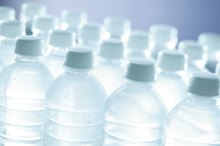Ingredients & Nutrition Facts of Diet Coke
Diet Coke is a carbonated beverage containing artificial ingredients including sweeteners, flavors and colors. The beverage is a no-calorie alternative to regular Coke. The Coca-Cola corporation first introduced Diet Coke in the United States in 1982; the company now markets and distributes the soda around the world.
Caffeine
A 12 oz. can of Diet Coke contains about 45 mg of caffeine. In comparison, a 5-oz. cup of coffee contains 60 to 150 mg; a 5-oz. serving of tea has 40 to 80 mg. Health Canada recommends that you consume no more than 2.5 mg of caffeine per 2.2 lbs. of body weight a day. Caffeine can start to affect you 15 minutes after you consume it. It can increase alertness, but can also reduce your fine motor coordination and lead to headaches, dizziness or nervousness, according to the University of Washington.
- can of Diet Coke contains about 45 mg of caffeine.
Sodium
The Ingredients in Diet Pepsi
Learn More
Diet Coke contains a small amount of sodium. When you drink a 12 oz. can, you take in 40 mg of sodium, which is 2 percent of the recommended daily intake.
Aspartame
Diet Coke contains the artificial sweetener aspartame. According to the FDA, aspartame is generally considered safe. The FDA reaffirmed this sweetener’s safety in 1996 after a study in Europe questioned it. The World Health Organization sets the acceptable daily intake of aspartame at 40 mg per 2.2 lbs. of body weight.
Aspartame consists of two main ingredients: aspartic acid and phenylalanine. People who have the rare genetic condition phenylketonuria, or PKU, need to avoid this ingredient, according to the University of Maryland Medical Center. If you do not have this condition, you do not need to watch out for this ingredient, according to MayoClinic.com.
- Diet Coke contains the artificial sweetener aspartame.
- The FDA reaffirmed this sweetener’s safety in 1996 after a study in Europe questioned it.
Preservatives and Colors
Diet Rite Cola Ingredients
Learn More
The citric acid, phosphoric acid and potassium benzoate in Diet Coke serve as preservatives. Preservatives prevent spoilage due to yeasts, bacteria, fungi and molds. They also prevent flavor and color changes and maintain the beverage’s freshness. Diet Coke also contains caramel color, an FDA-approved color additive. Color additives enhance naturally-occurring colors, provide color to foods that don’t have any, and offset color loss that occurs when a product is exposed to air, light or other environmental conditions, according to the FDA.
- The citric acid, phosphoric acid and potassium benzoate in Diet Coke serve as preservatives.
- Color additives enhance naturally-occurring colors, provide color to foods that don’t have any, and offset color loss that occurs when a product is exposed to air, light or other environmental conditions, according to the FDA.
Other Nutrients
Aside from sodium, Diet Coke is not a significant source of any vitamins or minerals that your body needs. It also is free of fat, fiber, cholesterol and sugars.
Related Articles
References
Resources
Writer Bio
Linda Tarr Kent is a reporter and editor with more than 20 years experience at Gannett Company Inc., The McClatchy Company, Sound Publishing Inc., Mach Publishing, MomFit The Movement and other companies. Her area of expertise is health and fitness. She is a Bosu fitness and stand-up paddle surfing instructor. Kent holds a bachelor's degree in journalism from Washington State University.









